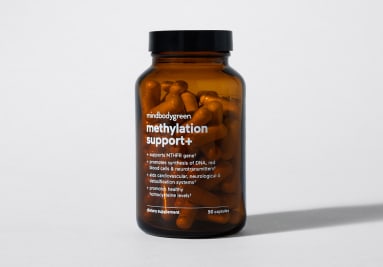B Vitamins: The Vital Key To Healthy Methylation & Brain Function*



When it comes to the central nervous system, there are a few habits we know to bolster our brain's health and function.
Perhaps you eat omega-3-rich salmon on days you need your mind to be sharp for a presentation or test, or maybe you make sure you're getting enough sleep on weeknights so you're not moody with customers at your workplace.
Whether you understand the mechanisms of these common brain health tips or not, you've certainly experienced the effects when you don't take care of your brain as well as you could. One vital process for top-notch cognitive function we're willing to bet you haven't given much thought? Methylation.
What is methylation?
Methylation is a biological process that happens in our cells one billion times per second and affects just about everything in the body. When it comes to neurological health, methylation has a profound impact on everything from mood regulation and neurotransmitter production to motor function and cognitive performance.
B vitamin status directly affects homocysteine levels and, ultimately, methylation.* Suboptimal methylation and high homocysteine levels can lead to health concerns, including the brain, over time if left unchecked. Individuals with MTHFR gene variations have an MTHFR enzyme that is less efficient at producing bioactive methylfolate, which makes them more prone to methylation-related health implications.
How methylation affects the brain.
So, how exactly does this universal biological process affect brain health? To begin to understand the relationship between methylation and the central nervous system, we have to back up to our B vitamin discussion.
Methylation is essentially the transfer of methyl groups to and from biological compounds (e.g., hormones, proteins, enzymes, DNA, etc.). Methyl groups come from a number of micronutrients and bioactives that we consume through our diet called methyl donors.
Why B vitamins are so important to methylation and brain function.
Bioactive B vitamins—specifically, folate, riboflavin, and vitamins B12 and B6—are major methyl donors that are absolutely vital to the methylation cycle.* When folate and methionine cycles (feeders of methylation) aren't running as smoothly as they could be (thanks to an MTHFR gene variation, suboptimal diet or lifestyle habits, or other health issues), the body isn't able to properly methylate B vitamins in their bioactive forms, and they can't be used in crucial physiological methylation pathways throughout the body.
If you know anything about the incredible neurological benefits of these essential vitamins, you know that insufficient levels of bioactive Bs can drastically affect the central nervous system1. B vitamins play a huge role in neurological function and mental well-being, affecting everything from glucose homeostasis2 and brain cell performance3 to neurotransmitter production, sleep health, and mood support.*
How B vitamins modulate homocysteine status.
In addition to the direct brain health implications of insufficient levels of bioactive B vitamins, homocysteine levels are also greatly affected. Without bioactive B vitamins, homocysteine conversion to methionine can suffer (leading to more homocysteine than desired), which can negatively affect cardiovascular and neurological health over time.*
In a study published by the Journal of Neurology, Neurosurgery, and Psychiatry4, a positive association between elevated levels of homocysteine and mood concerns was found, indicating that subpar folate metabolism and methylation have direct implications for neurological well-being. While research on the exact mechanisms of B vitamins, brain health, neurotransmitters, and methylation is ongoing, the science is clear—healthy methylation makes for a healthy nervous system.*
The bottom line.
Methylation is absolutely vital for optimal brain health and cognitive function—and B vitamins are essential for healthy methylation.* If you're looking to promote a robust methylation cycle and neurological health, consuming more B vitamins through your diet and high-quality supplementation is a great place to start.*
With activated riboflavin, vitamin B6, folate, vitamin B12, and betaine, mbg's gene-focused methylation support+ supplement was designed with individuals with the MTHFR gene variation in mind.* Getting the bioactive form of B vitamins helps these folks fuel proper methylation so they can give their brains the love and support they deserve each day.*

Morgan Chamberlain is a supplement editor at mindbodygreen. She graduated from Syracuse University with a Bachelor of Science degree in magazine journalism and a minor in nutrition. Chamberlain believes in taking small steps to improve your well-being—whether that means eating more plant-based foods, checking in with a therapist weekly, or spending quality time with your closest friends. When she isn’t typing away furiously at her keyboard, you can find her cooking in the kitchen, hanging outside, or doing a vinyasa flow.

